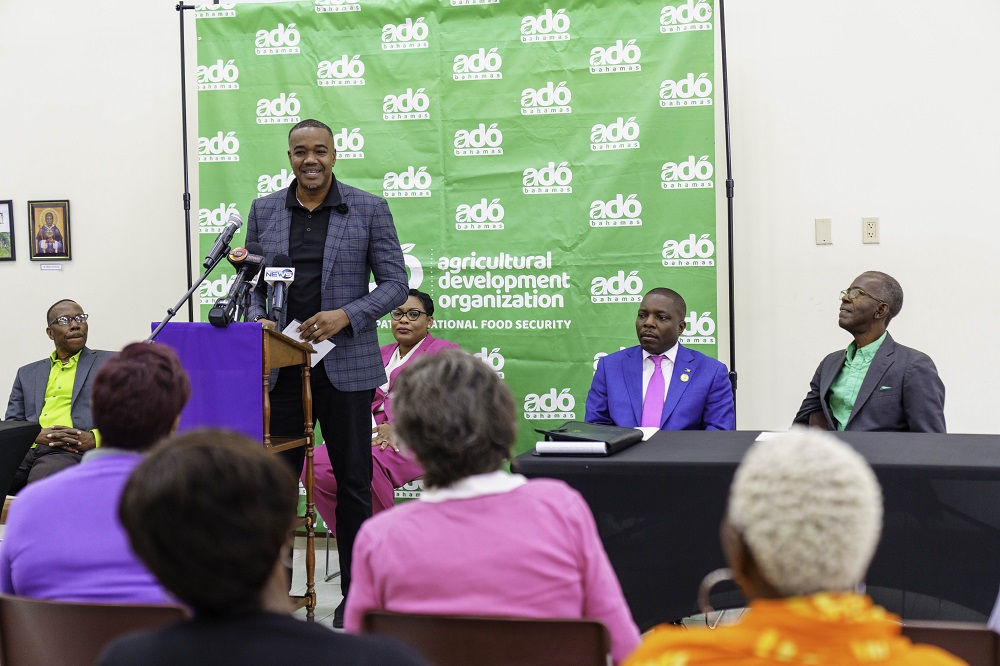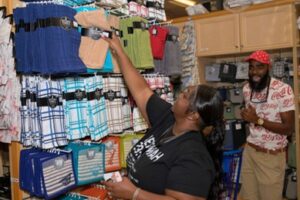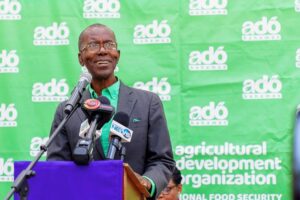
Philip Smith
#Nassau, December 20, 2023 — With a food import bill topping $1 billion annually and the vivid memory of supply chain shortage, the movement to grow more of what we eat and eat more of what we grow got a boost today when Royal Caribbean International (RCI) presented the last 200 of 400 backyard farming kits to the Agricultural Development Organization (ADO).
Recipients of the kits lined up at St. Thomas More Parish Hall, Centreville, ready to start or expand a garden farm they could manage at home with the aid of a field officer visiting once a month. Each kit was packed with soil, 72 seeds of dozens of varieties, small irrigation tubing and fertilizer.
Among the special guests at the presentation and distribution ceremony were Minister of Agriculture Jomo Campbell, RCI general manager of Bahamian business and president of the Royal Beach Club Philip Simon and ADO Executive Chairman Philip Smith.
This is the second time the agriculture minister participated in the backyard farm distribution of kits provided by a donation from Royal Caribbean International, a collaboration and program, he called “a shining example of corporate responsibility.”
“We cannot thank donors like Royal Caribbean enough,” said Philip Smith. “Without the tremendous outpouring of corporate support by a few key donors like Royal Caribbean, we would not be where we are today and where we are with having provided materials to start 2700 backyard farms in less than two years is just the beginning.”
Smith, who focused on feeding for 17 years including founding and heading up the Bahamas Feeding Network for nearly a decade, says growing what we eat is essential for two reasons.
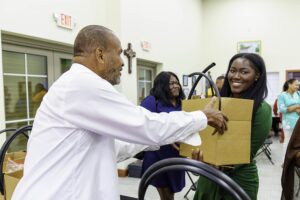
Agricultural Development Organization and Royal Caribbean International partner for Farming Kit Distribution in Nassau, Bahamas
“First, there is the issue of food security and I fully believe that the answer to that lies right in our own backyards. Our heritage is farming. Our ancestors did not clamber for greens, potatoes, yams, onions, cucumber, even eggs. They walked out into the back yard and picked what they needed that day. And the taste of a home-grown tomato is so much fresher than one picked elsewhere, packaged, trucked, put on a cargo ship, shipped across the seas, then the container trucked to a store before that tomato has been offloaded, labeled and put on a shelf. The stores try hard, but there is a world of difference.”
Smith also cites the nation’s declining health with greater incidences of hypertension, heart disease, cancer, diabetes and arthritis. He said the link to an increased dependence on processed and fast foods cannot be ignored.
Agriculture Minister Jomo Campbell cited multiple benefits from the good to grow campaign and the collaboration between ADO and partners – improved food security, economic opportunities, health benefits, environmental sustainability and community building.
“In earlier times, farming was not an unfamiliar profession in The Bahamas,” the minister recalled. “Many of our grandparents, mothers and fathers practiced substance agriculture where they grew crops according to their family’s needs…This program demonstrates that we can do this again and simultaneously cut down on our exorbitant food import bill that continues to be pegged at $1 billion.”
RCI’s Philip Simon explained the cruise company’s reason for strong support.
“Royal Caribbean International is committed to sustainability,” said Simon. “That commitment is evident in everything we do – in investing in the most advanced technology to minimize waste and maximize recycling onboard
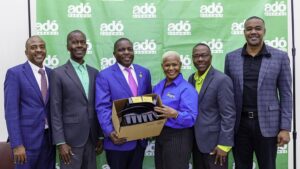
Agricultural Development Organization and Royal Caribbean International partner for Farming Kit Distribution in Nassau, Bahamas
our ships, in our commitment for the Royal Beach Club to be landfill waste free by 2030. But creating a sustainable planet takes more than massive recycling. It also involves the things we can do every day, including the nutritional benefits of growing our own food.”
Simon said RCI’s long-time support of the Bahamas Feeding Network lent naturally to supporting ADO.
“We understand that there will always be a need to feed but if we begin to grow more of our own and restore the joy of a farming culture, bringing us closer to the earth, we will all benefit and RCI is proud to be part of this important community initiative.”
In addition to backyard kits, ADO is assisting 26 schools throughout The Bahamas to create farms and on December 9, Smith and team will be in Exuma to help launch the Rolleville Commonage Community Farm with Deputy Prime Minister Chester Cooper officially opening the half-acre garden of greens and more.
Photo Captions:
Header: Royal Caribbean International General Manager of Bahamas business and president of Royal Beach Club Philip Simon addresses crowd at the distribution of 200 backyard farming kits at a ceremony at St. Thomas More Parish Hall. In the background, l-r, Pastor Pat Paul, Ministry of Agriculture Kendea Smith, Minister of Agriculture Jomo Campbell, and Agricultural Development Organization Executive Chairman Philip Smith. (Cay Focus Photography)
1st insert: ADO Executive Chairman Philip Smith accepts the donation of the last 200 of 400 backyard farming kits from Royal Caribbean International. Since its founding less than two years ago, ADO has helped start more than 2,500 backyard farms and restore what Smith calls the “the joy and pride of farming.” (Cay Focus Photography)
2nd insert: Constituents in the Centreville community register (photo left) and get their starter farming kit with soil, more than 70 seeds, irrigation tubing, fertilizer and the promise of assistance from a trained field officer. (Cay Focus Photography)
3rd insert: (L-R) Former MP Dion Smith; Philip Smith, Executive Chairman of ADO Bahamas; Hon. Jomo Campbell, Minister of Agriculture and Marine Resources; Nicolette Archer, Executive Assistant & Administrator at Bahamas Feeding Network; Pastor Patrick Paul of Bahamas Assemblies of God and Philip Simon, President of Royal Beach Club and General Manager of Royal Caribbean International Bahamas. (Cay Focus Photography)
